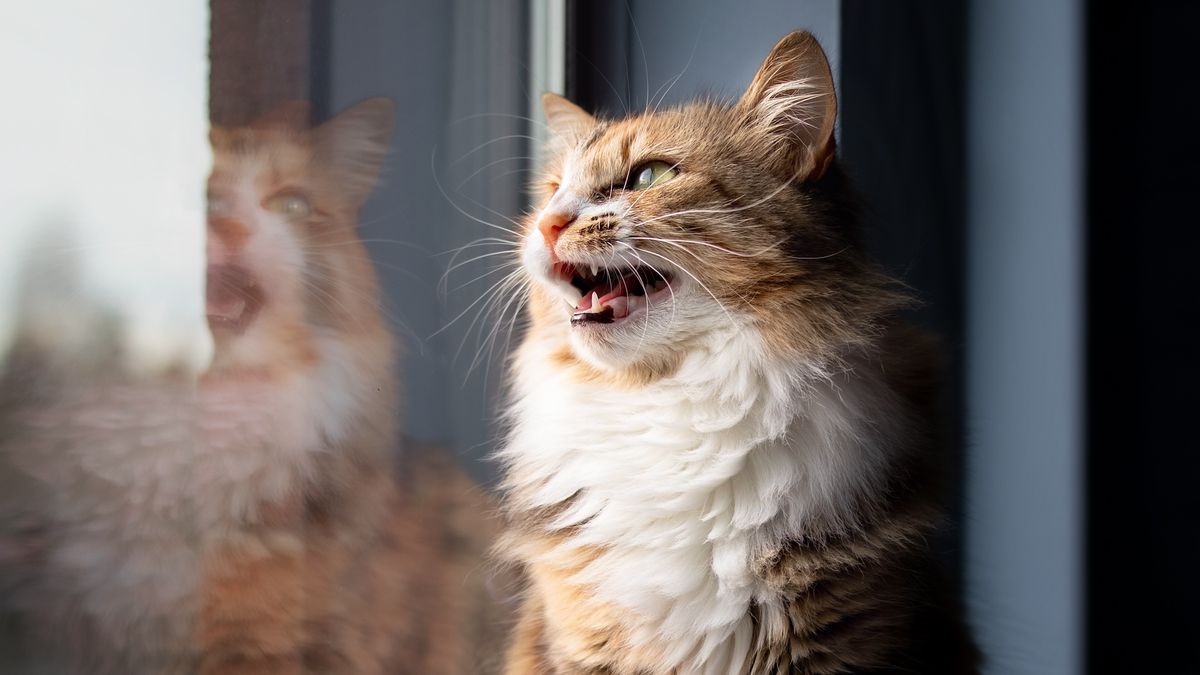Cats make a variety of sounds to communicate with the people and animals around them. Meowing, principally directed at humans, is a call for attention (or food), while hissing or growling at other cats or animals indicates stress and hostility. But what about the quiet chattering noise cats sometimes make at prey?
“It’s very hard to say what exactly is going on, but it doesn’t appear to be communicating to us or to other animals,” cat behaviorist Mikel Delgado told Live Science. Cats’ independence makes them particularly difficult to study in the lab, so there are no current studies directly investigating this behavior. However, cat owners and researchers have come up with a number of possible explanations for this cute chatter.
“One hypothesis is that it’s a frustration behavior,” Delgado said. “They can see the prey, but there’s a barrier between them.” Much like how people grumble or humph when annoyed, these unusual vocalizations could simply be the expression of a particular feline emotion. “It doesn’t necessarily have to be a negative experience,” Delgado said. “It could just be excitement.”
However, there isn’t any scientific evidence for this theory, and designing an experiment to test the hypothesis wouldn’t be simple. “First you’d want to know under what circumstances they chatter and what they do it at,” Delgado said. “But obviously, demonstrating the emotional response of the cat would be more complicated, and you’d probably have to include some physiological measures of stress, like stress hormones.”
Another idea is that cats are opening their mouths to enhance their sense of smell. Perhaps “they are trying, by opening and closing their mouths, to bring air into where they have something called the vomeronasal organ or the Jacobson’s organ,” explained Jonathan Losos, an evolutionary biologist at Washington University in St. Louis and author of “The Cat’s Meow: How Cats Evolved from the Savanna to Your Sofa” (Viking, 2023). Located on the roof of the mouth, this sensory organ acts like a second nose and enables cats to smell chemicals that are different from those detected by the nose alone.
By directing air flow toward this organ, chattering could help cats get more sensory information about their environment — but again, designing a study to effectively test this hypothesis would be immensely difficult.
Related: Why do cats hate closed doors?
One possible explanation for cat chatter has a little more scientific backing: mimicking. “Some researchers observed a margay (Leopardus wiedii), a small and spotted wild cat from South and Central America, making a call when it was trying to hunt a group of small monkeys,” Losos told Live Science. “They claimed that the sound was similar to the sounds the monkeys make themselves and that the local Indigenous people said that predators often made sounds like their prey to attract them.”
Cats’ chattering bears some similarity to the chirping of small birds — typical prey for domestic cats (Felis catus) — so the felines could be using this noise to attract prey.
But aside from this single observation in margays, there are no other reports of mimicking behavior in wild cat species, and for Losos, this lack of information about the wider cat family is a real impediment to studying this behavior in the domestic cat.
“Most small cats are not well studied, and we don’t know a lot about them, including the domestic cat’s ancestor, the North African wildcat,” he said. “The key to understanding domestic cats is to have a much better understanding of wildcats so that we know whether behaviors are inherited from their ancestors or have arisen since domestication.”
For the present, exactly why cats chatter remains a mystery, but Delgado suggested that cat owners themselves could provide vital information to help uncover the reason. We’d need to understand what animals (or toys) cats chatter at and whether this is something they do outside the house as well as in, Delgado said. “Surveying cat owners [about] what they are observing and whether their cats chatter would be interesting.”


